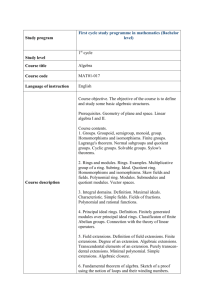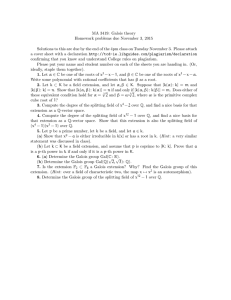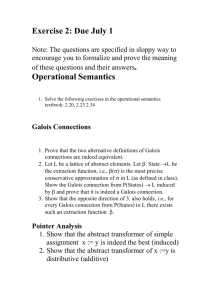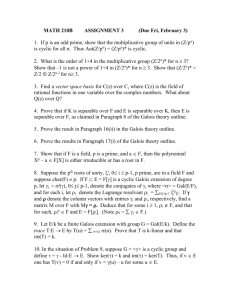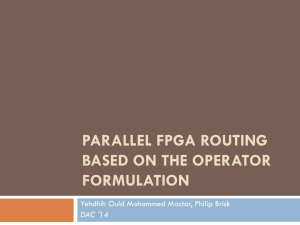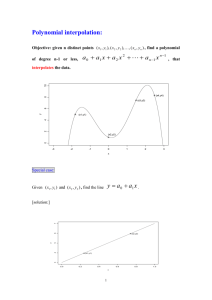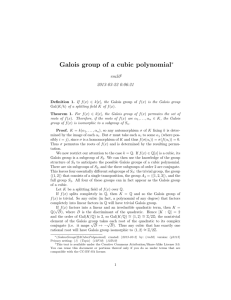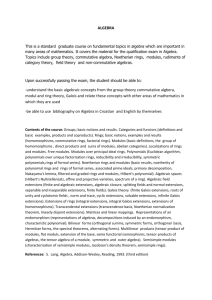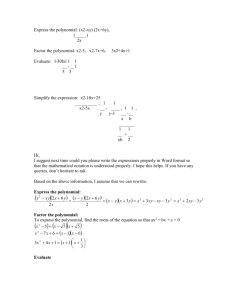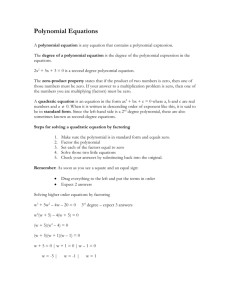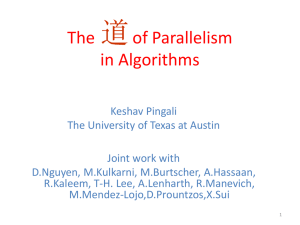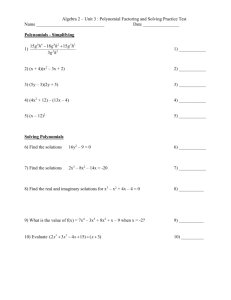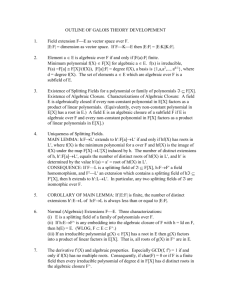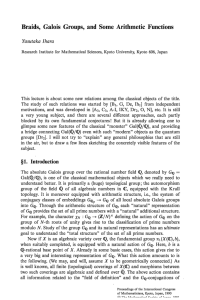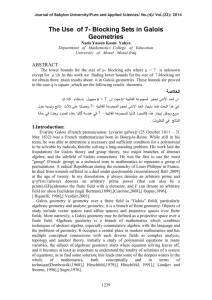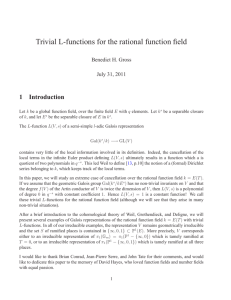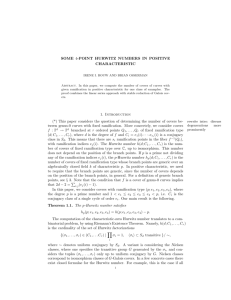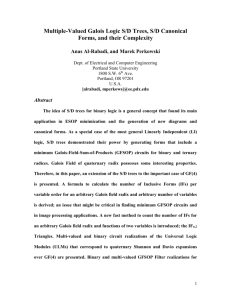GALOIS THEORY (code: 451)
advertisement
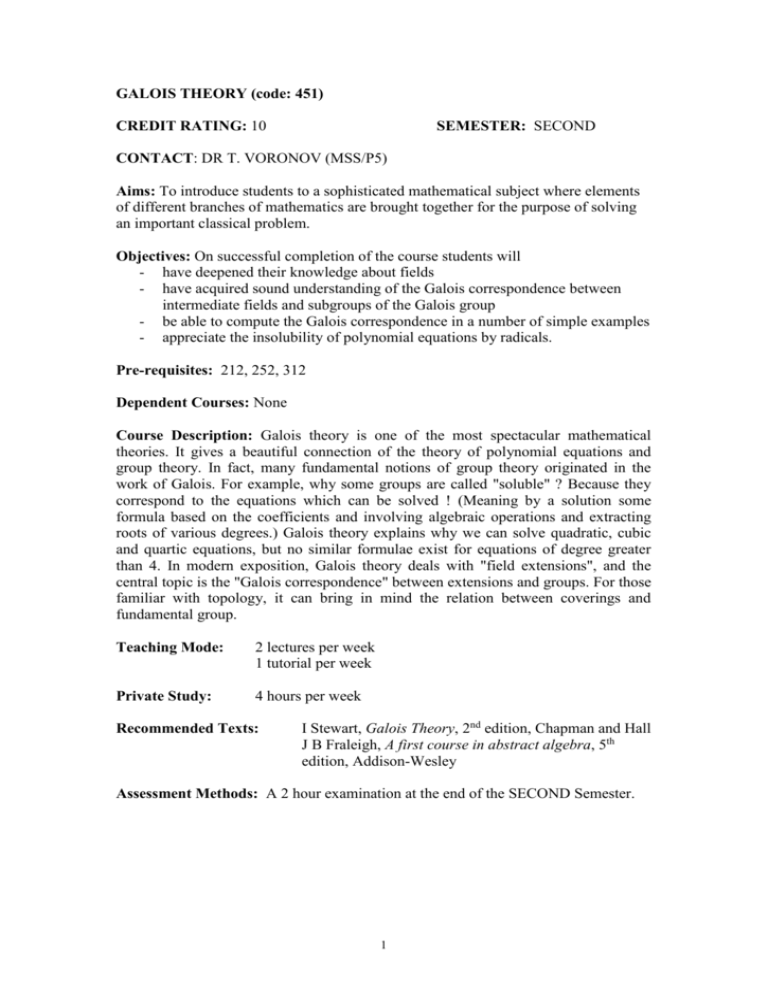
GALOIS THEORY (code: 451) CREDIT RATING: 10 SEMESTER: SECOND CONTACT: DR T. VORONOV (MSS/P5) Aims: To introduce students to a sophisticated mathematical subject where elements of different branches of mathematics are brought together for the purpose of solving an important classical problem. Objectives: On successful completion of the course students will - have deepened their knowledge about fields - have acquired sound understanding of the Galois correspondence between intermediate fields and subgroups of the Galois group - be able to compute the Galois correspondence in a number of simple examples - appreciate the insolubility of polynomial equations by radicals. Pre-requisites: 212, 252, 312 Dependent Courses: None Course Description: Galois theory is one of the most spectacular mathematical theories. It gives a beautiful connection of the theory of polynomial equations and group theory. In fact, many fundamental notions of group theory originated in the work of Galois. For example, why some groups are called "soluble" ? Because they correspond to the equations which can be solved ! (Meaning by a solution some formula based on the coefficients and involving algebraic operations and extracting roots of various degrees.) Galois theory explains why we can solve quadratic, cubic and quartic equations, but no similar formulae exist for equations of degree greater than 4. In modern exposition, Galois theory deals with "field extensions", and the central topic is the "Galois correspondence" between extensions and groups. For those familiar with topology, it can bring in mind the relation between coverings and fundamental group. Teaching Mode: 2 lectures per week 1 tutorial per week Private Study: 4 hours per week Recommended Texts: I Stewart, Galois Theory, 2nd edition, Chapman and Hall J B Fraleigh, A first course in abstract algebra, 5th edition, Addison-Wesley Assessment Methods: A 2 hour examination at the end of the SECOND Semester. 1 Course 451 No of lectures Syllabus 3 Recollection: factorization of polynomials, irreducibility, Gauss's Lemma, Eisenstein's test. Zeros and factorization. Formal derivatives. 3 Field extensions. Simple extensions, algebraic and transcendental case. Minimum polynomial. Construction of simple algebraic extension from an irreducible polynomial. Classification of simple extensions. 3 Degree of extension. Recollection of vector spaces and dimension. Tower law. Algebraic elements and algebraic extensions; finite extensions. Algebraic numbers. Geometric constructions with ruler and compasses. 2 The Galois group of an extension. Examples. The Galois correspondence between subgroups and intermediate fields. 3 Splitting field for a polynomial. Existence, uniqueness up to isomorphism. Normal extensions. Relation to splitting fields. Normality of intermediate extension. Normal closure. 2 Separability. Example of inseparable polynomial. Separability of all polynomials in characteristic zero. Separable extensions. Separability of intermediate extensions. 2 Dedekind's Lemma about linear independence of distinct monomorphisms. Degree of the extension corresponding to a group of field automorphisms. 3 Normality and monomorphisms. Transitivity of the Galois group on the zeros of an irreducible polynomial in a normal extension. Properties equivalent to normality. 3 Galois groups of normal separable extensions. Properties of Galois correspondence for normal separable extensions. Normal subgroups and normal intermediate extensions. The Fundamental Theorem of Galois Theory. 3 Application to polynomial equations. The Galois group of a polynomial. Galois group as a group of permutations. Solution by radicals and radical extensions. "Solubility" of the Galois group of a radical extension. Main properties of soluble groups. Example of insoluble quintic. "General" polynomial equations. Revised : January 1999 2 3 4
